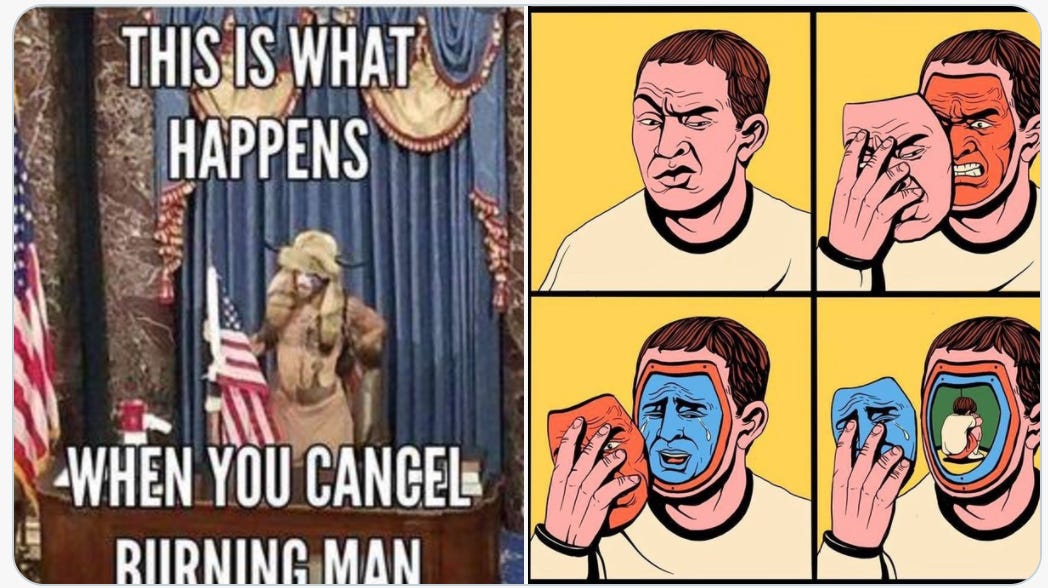This newsletter goes out to more than 1,000 ambitious frontier people. If you like it, share it with a friend, support me on Patreon, or apply for my online school, Roote.
Hey you!
1) New podcast episode this week: #78 Martha Minow: When Should Law Forgive?
Martha is a brilliant human rights legal scholar at Harvard. She’s a great teacher too— during the 2008 Presidential campaign, Obama said, "When I was at Harvard Law School I had a teacher who changed my life—Martha Minow."
In my interview with Martha, we examine her recent book When Should Law Forgive? and apply it to grievances of our current moment—pardons, polarization, student debt. Check out the convo if you want to think about structured processes for forgiveness.
Or if you’re more into reading, I wrote a review of Martha’s book here: Book Review: "When Should Law Forgive?".
“Forgiveness does not change the past, but it does enlarge the future.”
— Paul Boese
One tension that Martha explores is forgiveness vs. accountability. For example, should we forgive child soldiers for murder? Martha writes:
Child soldiers should be seen as individuals struggling for meaning and needing to maintain a sense of their own moral agency, including recognition of past wrongdoing.
Ironically, viewing child soldiers as innocent victims puts forgiving them beyond reach, because forgiveness is only for those who have committed a wrong.
Imposing no consequences for the harms committed by former child soldiers may impair development over time of their own identities as moral agents.
As Emmanuel Jal, a child soldier turned rapper, sings:
“I’m in another war. This time it’s my soul that I’m fighting for.”
Martha also explores whether law can forgive too much.
If law forgives too much, it undermines itself. It's seen as too mutable. There’s a paradox here—consistent laws allow for mercy. Minow quotes Justice Anthony Kennedy:
"A people confident in its laws and institutions should not be ashamed of mercy."
Finally, Martha explores the role that individualism plays in forgivessness. As we’ve touched on in past newsletters, the West is WEIRD and individualistic. It means that we more often believe the fundamental attribution error, a cognitive bias which states that my failure is the result of the situation, but your failure is because you're a bad person.
Minow highlights how forgiveness processes, like bankruptcy, can forgive by acknowledging context instead of just blaming the individual:
Discharging debt through a bankruptcy process addresses larger patterns. It not only acknowledges and adjusts the behavior of the immediate parties, the debtor and creditors, but also implicates the larger credit market and even the bad luck that influences debt.
Are college students dumb for taking on debt? Are Trump supporters evil for storming the capitol? Beware the fundamental attribution error in your WEIRD mind!
For more on forgiveness, check out the book review itself.
LINKS
1) Why Markets Boomed in a Year of Human Misery
This article clearly shows why stock (and crypto) markets rose in 2020.
In summary: Americans are earning more and spending less. All that saving needs to go somewhere (stonks and crypto).
Stock markets will continue to grow until stimulus stops and consumer spending picks back up. In other words, until widespread vaccines in late summer.
2) Public Service Announcement: the UK SARS-CoV-2 variant B117 may drastically change your life beginning around March. It is 50-70% more transmissible. This makes it extremely difficult to control, even with lockdown measures. See the UK’s vertical graph in the face of lockdown.
It essentially a race between vaccines and B117. Think of the next two months as a less risky time, and emotionally prepare yourself for an intense spring.
Here’s microCOVID’s B117 overview.
3) Crypto markets are skyrocketing. People are getting rich. Kewl rich folks donate moneyz.
I moderated the panel below to help crypto folks give in an effective altruist way. Each of these folks gave $50,000 to SENS!
Another way you might be getting richer—if you got $600 from the U.S. government. If you’re feeling it, please #PassItOn / #SplitTheCheck / #PassTheCheck. I donated my $600 to GiveDirectly.
4) Two quick notes on the storming of the U.S. Capitol last week.
First, the stab-in-the-back myth (h/t Albert Wenger) was a crucial part of a shared Nazi narrative. StopTheSteal will be a powerful shared myth for future authoritarian/populist action.
Second, a reminder that people’s terminal goal is to get our needs met.
We need Future Me meaning. When that gets taken away, you get QAnon LARPers self-generating meaning.
We also need Now Me safety and Now Us connection. Trump said, "I know your pain. I know you’re hurt. We love you." But if those needs aren’t met, hurt people hurt people.
5) The Onion (from 2009): U.S. Government Stages Fake Coup To Wipe Out National Debt
JOBS AND OPPORTUNITIES
If you’re interested in how platform intermediaries should regulate info, apply to be a Wikipedia fellow at Yale’s Law’s Information Society Project.
If you’re working on a climate tech startup, USV just started a new Climate Fund and is looking for founders.
I’m looking for a driven and concrete co-founder for Roote. Learn more and reach out here.
EVENTS
Weekly Bento (recurring on Sundays)
Effective Altruist Events Calendar (recurring)
Interintellect Salons (recurring)
The Stoa (recurring)
MUSIC
This is your occasional reminder that Hatsune Miku exists.
Hatsune Miku is a singer created by Yamaha in 2007 to sell a type of music software called a vocaloid. She “looks” like this:
Hatsune is the “singer” behind the vocaloid software. This software allows producers to input text and pitches to have Hatsune “sing” them. It’s kind of like text-to-voice. “Hatsune, please sing this newsletter to the melody of the Amazing Grace.”
Hatsune was so successful because she was the first “crowdsourced singer”. Anyone could program her to sing, and soon that crowd made software that allowed her to dance too.
One of my favorite performances of hers is on David Letterman:
There’s lots of juicy discussion around crowdsourced musicians like Hatsune. She cannot express consent and is used for ロリコン – lolicon, a form of child pornography. But by being digital, she doesn’t have issues of depression that so many celebrities have. And how should Yamaha think about Hatsune as copyright vs. crowdsourcing?
Hope you have a good week! Warmth, Rhys
❤️ Thanks to my generous patrons ❤️
Patrick Walker, Brady McKenna, Shira Frank, David Hanna, Benjamin Bratton, Michael Groeneman, Haseeb Qureshi, Jim Rutt, Zoe Harris, Yancey Strickler, Jacob Zax, David Ernst, Brian Crain, Matt Lindmark, Colin Wielga, Malcolm Ocean, John Lindmark, Collin Brown, Ref Lindmark, James Waugh, Mark Moore, Matt Daley, Peter Rogers, Darrell Duane, Denise Beighley, Scott Levi, Harry Lindmark, Simon de la Rouviere, and Katie Powell.





